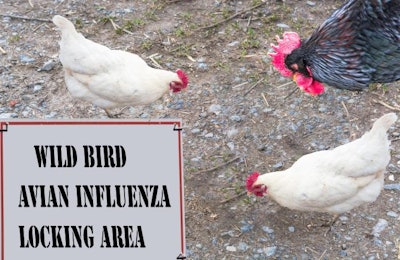
New outbreaks of highly pathogenic avian influenza (HPAI) have been reported in domestic poultry and ostriches in China, India, Nigeria, South Africa, and Taiwan over the last two weeks.
Taiwan’s Council of Agriculture has informed the World Organisation for Animal Health (OIE) of four new outbreaks of HPAI linked to the H5N2 virus variant. Three outbreaks involved native chickens, and one was in a turkey flock. The authorities were alerted when mortality rates increased at the farms, three of which were in Yunlin county, and one in Changhua.
Almost 65,500 poultry were involved in these outbreaks, with 4,260 deaths and the rest of the birds were culled after the presence of the virus was confirmed.
In China, HPAI H5N6 was detected among a village poultry flock in Xingquan in Yunnan province in mid-February. More than 460 birds died, and almost 56,000 were culled to prevent the further spread of the disease.
Previous outbreaks in the province late last year resulted in the loss of more than 20,000 poultry at two farms.
HPAI returns to India, Pakistan
India’s agriculture ministry has reported to the OIE the first outbreak of HPAI linked to the H5N1 virus variant in domestic poultry. At the end of January, a total of 26 birds died among what is described as a “backyard” flock of almost 5,000 poultry in the city of Godda in the northeastern state of Jharkhand.
Around that time, the same virus subtype was detected in wild birds found dead in Godda, and Gomia in Jharkhand, and at Jehanabad in neighboring Bihar state.
After an absence of almost 12 months, the H5N8 variant of HPAI has been detected in the wild bird population of Pakistan. The national animal health agency has confirmed that the virus was found in dead birds at two locations in Islamabad in early January.
Africa: New HPAI outbreaks in Nigeria, South Africa
There were three confirmed outbreaks of HPAI linked to the H5N8 virus variant in Nigerian poultry flocks between the end of January and mid-February, according to the OIE. Affected were backyard pullets in Bauchi state, as well as an egg farm and a mixed chicken flock in Plateau. Both states are in central Nigeria. A total of 4,400 birds were lost to the disease, including 176 mortalities.
Nigerian poultry farmers have been urged to arrange insurance cover to mitigate against unexpected losses to their business, reports Punch. The warning came from the chairman of the Nigerian Insurers Association as the latest outbreak in Plateau state was announced.
Based on reports from the Federal Ministry of Agriculture, and Rural Development to the OIE, there have been no new outbreaks of HPAI linked to the H5N1 virus subtype, which was first detected in the West African country four years ago.
South Africa’s commercial ostrich sector has been battling the H5N8 HPAI virus for almost two years, and a new report from the agriculture ministry to the OIE records a further two outbreaks in Western Cape Province. Of the more than 6,000 birds, 174 died but none has been culled.
Adding to the sector’s disease challenges, the H7N2 low pathogenic avian influenza (LPAI) virus has been detected for the first time in almost one year. A total of 75 birds out of the commercial flock of 4,372 ostriches in Free State tested positive for this virus in early February.
After an absence of two years, South Africa’s agriculture ministry has declared to the OIE that the earlier H5N2 LPAI disease situation has been resolved.
US: LPAI situation “resolved”
The earlier LPAI disease situation linked to the H5N2 virus variant has been closed, according to a recent report from the U.S. Department of Agriculture to the OIE. Investigations have been completed, all affected premises are clear of the virus, and quarantines have been lifted.
These developments followed a total of eight outbreaks of the disease in commercial turkey flocks in the counties of Stearns and Kandiyohi, Minnesota, in October and November of last year. More than 382,000 birds were culled at the affected premises to control the disease.
New human cases of avian influenza A
No new cases of avian influenza A of the virus types H5N1 or H7N9 have been reported recently to the World Health Organization (WHO).
Between late January and mid-February, two cases linked to the H9N2 virus variant were recorded by the authorities in China. Affected by mild illness were a two-year-old boy in Hunan province, and an eight-year-old girl in Yunnan. Although WHO notes that the avian influenza A(H9N2) virus is enzootic in poultry in China, neither case history mentions contact with birds before infection.

















